History of a Pub, an Irish Pub
Once upon a time Irish people, whoever they were - probably those who slaughtered the Tuatha Dé Danann - drank alcohol in public places such as shops, post offices, and Funderland.
These houses of drinking, merriment, and roller-coasters evolved naturally into public houses, or pubs for short, and all was right with the world.
But then the potato arrived from the Andes. The perfect ingredient for the sparse-until-then Christmas dinner, the potato was embraced by the Irish, whoever they were - probably those who wore ornate jewellery and skirts as they wiped out the druids.
And everybody ate sixteen potatoes a day, went down to the pub, and lived happily ever after. Except for a famine.
Global mass emigration followed and pubs in host countries began to have an Irish flavour foisted upon them. Mixing with local customs these pubs evolved naturally within an immigrant population, and became Irish Pubs.
Despite potatoes even being served however, these pubs were not quite the same as the pubs back in the land of the wet potato and Information Technology. And that was fine, for if God had wanted the world not to be varied he would have invented fast food.
But then unscrupulous Irish people, whoever they were - probably the horned-hatted invaders who killed the jewellery-bedecked Christian scribes before settling in Howth, Clontarf and Finglas - said, Hey! Forget making merriment and coaster-rollering, we can make money! So they made sawdust.
And they scattered the sawdust around London, New York, Boston, Liverpool, Berlin, Sydney, and Amsterdam. Around barrels and bockety furniture by unpainted walls. And they stole bicycles, and old farming and dental equipment, and they called it decor. They said it was just like the pubs at home.
And the people at home - Irish people who had taken an oath to a monarch and taken lands from the Norsesiders - they said, No it’s not like the pubs here at home, but you do appear to be making money, would you mind if we copied you? Thousands of bicycles disappeared from the streets of Dublin. Dental expenses went up.
And the sons and daughters of those who had fled the wet potato crop went on holidays to check the spelling of their names. They returned to the land of their fathers and mothers, found their cousins, and went down the pub.
This could go down really well back where I live, they said staring at their first pint. It’s actually your round, responded the Irish people, whoever they were - probably people from England who didn’t believe in God or Richard Harris.
Playing bumpers in the back room after hours, the resourceful visitors asked their hosts if they could buy their pub. And to claim the VAT at the airport they asked for it to go, in a box. The host agreed and said he’d give the visitor six such jigsaws.
Brought up on WalMart the visitor then asked for one each of a Victorian, a Georgian, a Peasant, a Cottage, and a Famine model. All to go. Not a problem, says the agreeable host. So the visitor gets greedy. And would ya throw in one of those drum things up there on the wall.
One of the laws of conversations in pubs is that nothing that is said, however vehemently, is actually meant, but it is to be treated as if it has never been more meant, so long as all parties are within the walls of the establishment. And therefore once the premises have been vacated and the haze has lifted, calling a person on what they said while in the roller-coaster of the pub, is the height of bad manners.
Carrying his six boxes, the bad mannered visitor leaves Ireland and returns to the land where he is Irish, whatever that means. Promptly the jigsaws are assembled. People who have watched The Quiet Man and The Snapper rush through the doors to chase their wool and to tell turkey jokes. They are met by a hostess. She’s not for the chasin’.
In fact she’s not even legally allowed to drink. Neither does she laugh at the jokes, though she does smile in a synchronized way as in the background the Cranberries are screaming Zombie. She escorts people to tables where they are served pints of stout with pictures of genitals drawn on their creamy heads.
One day a man who doesn’t make enough money walks in the doors handbuilt by Irish people, whoever they are - probably Scottish people with Slavic names and somebody else’s land. The man owns a resort in Las Vegas where he has an authentic Stonehenge, Angkor Wat, and Welsh Mine. An Irish pub would complete the set so he asks the owner for a look at the back up copy of the plans for the jigsaw. The owner puts down his love-stick and stops beating his goat.
In Vegas an interpretation of the Irish pub, seen in a land not Irish, is constructed. Irish music for all ages, ‘fun, rowdy and interactive’, is performed on nights that aren’t school nights. Money is made.
Because holiday makers from far away cannot resist, especially Irish people, whoever they are - probably those horned-hatted invaders who stopped off in France for a holiday to lose their horned-hats while gaining horse-riding skills and Christian beliefs, before finally arriving in Ireland to build holiday homes that looked like anti-social castles, and ultimately become more Irish than the Irish themselves - whoever they are.
See Other Things Which Surely Can’t Be Related:
• Irish Place Names and Illegals
• An Irish Odyssey in Kansas City
• Ten Years of Being Authentically Irish

 Eolaí gan Fhéile:
Eolaí gan Fhéile: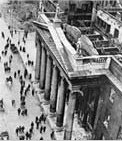
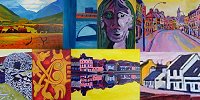

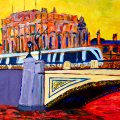
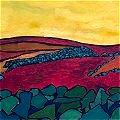
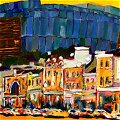
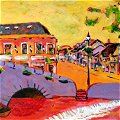
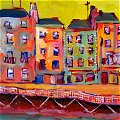
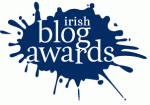
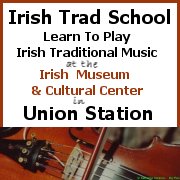


Ar fheabhas, a (sain)Eolaí! Thar barr!
I read this over breakfast the day it was posted and 24hours later I was still removing the cornflakes I sprayed all over my laptop.
Any chance you could flag posts likely to cause uncontrollable laughter with a warning? Maybe an icon of a cereal bowl with a big red X through it.
Go dté tú slán
Perhaps we could establish an international standard for such a symbol.
Smilies and the family of emoticons might obviate the need for the frequent riposte of “I was joking”, but I think you’re right in that there isn’t a symbol to tell you in advance that an attempt at humour is coming your way.